5 downloads
Title of document: Why and how should policy makers support organic agriculture Authors: IFOAM Journal’s name if any: Ministry/Government Agency/Organisation: IFOAM Year of publication: Geographic focus: General Main issues / topics addressed (for example: The academic perspective: economic rational; The public goods generated by OA; Why “subsidize” organic agriculture?; The organic policy tree…) School of agroecology (if any): Web address to original document (if any): Summary: General presentation for Why and how should policy makers support organic agriculture by IFOAM Read More
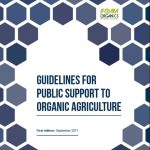
14 downloads
Title of document: Guidelines for Public Support to Organic Agriculture _ Version English & African Authors: IFOAM Journal’s name if any: Ministry/Government Agency/Organisation: IFOAM Year of publication: 2017 Geographic focus: Africa Main issues / topics addressed (for example: Context, scope and use of these guidelines; Why it makes political sense to support organic agriculture; History and overview of public support to organic agriculture globally; Determining the right mix of support measures: national/regional action plans and guidelines…) School of agroecology (if any): Web address to original document (if any): https://www.ifoam.bio/en/global-policy-toolkit-public-support-organic-agriculture Summary: the "Guidelines for public support to organic agriculture": these guidelines make the cornerstone of the toolkit and present the fullest possible compilation of facts, arguments and tips of the full panel of policy measures that can be conceived to support organic agriculture. Most of the sections of this main report are also broken down into separate documents, for easier download and use. The report is targeted to policy makers and policy advocates. IFOAM-Organics International also developed a special Sub-Saharan African version of the main report, which focuses on the information most relevant in the context of Sub-Sarahan African countries Read More
7 downloads
Title of document: Annex of ADG's activity in Cambodia Authors: ADG Journal’s name if any: Ministry/Government Agency/Organisation: ADG Year of publication: Geographic focus: Cambodia Main issues / topics addressed (for example:…) School of agroecology (if any): Web address to original document (if any): Summary: 3 Annex of ADG's activity in Cambodia Read More
33 downloads
Title of document: Posters “CORAD Chin State Myanmar” Authors: CORAD Journal’s name if any: Ministry/Government Agency/Organisation: CORAD Year of publication: Geographic focus: Myanmar Main issues / topics addressed (for example:…) School of agroecology (if any): Web address to original document (if any): Summary: 8 Posters of CORAD Chin State Myanmar Read More
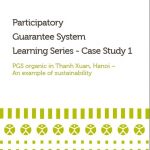
27 downloads
Title of document: Participatory Guarantee System Learning Series - Case Study 1 “PGS organic in Thanh Xuan, Hanoi – An example of sustainability” Authors: VECO Journal’s name if any: Ministry/Government Agency/Organisation: VECO, ALiSEA Year of publication: 2018 Geographic focus: Vietnam Main issues / topics addressed (for example: PGS organic in Thanh Xuan, Hanoi – An example of sustainability; Context; PGS operational model; PGS’ performance in Thanh Xuan…) School of agroecology (if any): Web address to original document (if any): Summary: Participatory Guarantee System (PGS) is a low-cost quality assurance mechanism that guarantees the quality of agricultural products and has the potential to regain consumers’ trust. Implemented in 66 countries worldwide, it has been used in Vietnam for over 10 years. As part of the project “Capitalisation of Participatory Guarantee System experiences in Vietnam for upscaling & institutionalisation”, Vietnam National University of Agriculture and Rikolto investigated all the existing PGS in Vietnam to assess their strengths and weaknesses and come up with recommendations on how to improve PGS in the Vietnamese context. This case study investigates the factors that made PGS Thanh Xuan the most successful PGS model in Vietnam and identifies some of the features that should be replicated by other PGS to improve their sustainability Read More
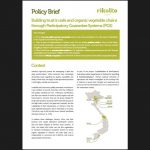
21 downloads
Normal 0 false false false FR X-NONE TH /* Style Definitions */ table.MsoNormalTable {mso-style-name:"Table Normal"; mso-tstyle-rowband-size:0; mso-tstyle-colband-size:0; mso-style-noshow:yes; mso-style-priority:99; mso-style-parent:""; mso-padding-alt:0in 5.4pt 0in 5.4pt; mso-para-margin:0in; mso-para-margin-bottom:.0001pt; mso-pagination:widow-orphan; font-size:10.0pt; font-family:"Times New Roman","serif"; mso-ansi-language:FR; mso-bidi-language:AR-SA;} Title of document: Building trust in safe and organic vegetable chains through Participatory Guarantee Systems (PGS) Authors: VECO Journal’s name if any: Ministry/Government Agency/Organisation: VECO, ALiSEA Year of publication: 2018 Geographic focus: Vietnam Main issues / topics addressed (for example: Context; What is PGS?; How does PGS work? What results have PGSs achieved in Vietnam?; What are current challenges?…) School of agroecology (if any): Web address to original document (if any): Summary: A Policy Brief ²Building trust in safe and organic vegetable chains through Participatory Guarantee Systems (PGS)² Read More
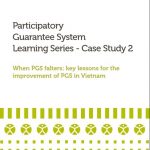
16 downloads
Title of document: Participatory Guarantee System Learning Series - Case Study 2 “When PGS falters: key lessons for the improvement of PGS in Vietnam” Authors: VECO Journal’s name if any: Ministry/Government Agency/Organisation: VECO, ALiSEA Year of publication: 2018 Geographic focus: Vietnam Main issues / topics addressed (for example: When PGS falters: key lessons for the improvement of PGS in Vietnam; Context; Challenges; Recommendations…) School of agroecology (if any): Web address to original document (if any): Summary: Participatory Guarantee System (PGS) is a low-cost quality assurance mechanism that guarantees the quality of agricultural products and has the potential to regain consumers’ trust. Implemented in 66 countries worldwide, it has been used in Vietnam for over 10 years. As part of the project “Capitalisation of Participatory Guarantee System experiences in Vietnam for upscaling & institutionalisation”, Vietnam National University of Agriculture and Rikolto investigated all the existing PGS in Vietnam to assess their strengths and weaknesses and come up with recommendations on how to improve PGS in the Vietnamese context. The case study below looks at one PGS in particular which has struggled with sustainability and operational effectiveness Read More
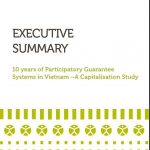
30 downloads
Title of document: 10 years of Participatory Guarantee Systems in Vietnam –A Capitalisation Study Authors: VECO Journal’s name if any: Ministry/Government Agency/Organisation: VECO, ALiSEA Year of publication: 2018 Geographic focus: Vietnam Main issues / topics addressed (for example: 10 years of Participatory Guarantee Systems in Vietnam – A Capitalisation Study; How does PGS work in Vietnam? …) School of agroecology (if any): Web address to original document (if any): Summary: Executive Summary: 10 years of Participatory Guarantee Systems in Vietnam –A Capitalisation Study Read More
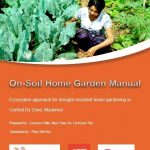
94 downloads
Title of document: On-Soil Home Garden Manual: Ecosystem approach for drought resistant home gardening in Central Dy Zone, Myanmar _ Version English and Myanmar Authors: Lorenzo Fellin, Moe Thae Oo, Lin Kyaw Thu Journal’s name if any: Ministry/Government Agency/Organisation: TDH, GRET/ALiSEA, AFD Year of publication: 2018 Geographic focus: Myanmar Main issues / topics addressed (for example: Home garden design and construction; Conservative Practices; Crop Plan; Garden Management…) School of agroecology (if any): Web address to original document (if any): Summary: Climate and soil type in the Dry Zone makes vegetable cultivation and availability extremely difficult, during the dry season and not only. From December to April most farmers of the area can only wait until the rainy season to begin cultivation of main crops, such as Pigeon Pea, Mung Bean, Sesame and Groundnut. However, the nutritional input given by fresh and green vegetable is often insufficient. The situation is worsened by climate change and the tendency of farmers to rely on extensive agriculture based on chemical input. While this approach might give initial benefits on productivity, it is highly unsustainable and deepens the environmental problems of the area (soil erosion, loss and desertification). However, thanks to the right techniques and conservative practices is possible to: cultivate all year round without relying on excessive chemical inputs; improve nutritional intake and decrease expenses on food. This has been the aim of ALiSEA project Ecosystem approach for drought resistant home gardening in Central Dry Zone implemented by TDH Italy: improving the livelihood of the beneficiaries through sustainable home garden vegetable production. The purpose of the following handbook is to provide the necessary information for the construction and management of a home garden using agroecological practices Read More
9 downloads
Title of document: A Vietnamese agricultural cooperative’s involvement in the food safety value chain: Perspective and Policy Authors: Dr. Dao The Anh Journal’s name if any: Ministry/Government Agency/Organisation: CASRAD and FCRI Year of publication: Geographic focus: Vietnam Main issues / topics addressed (for example: Status of agricultural cooperatives in the transition process under the Cooperatives Law 2012; Real situation of cooperatives involving in food safety value chain…) School of agroecology (if any): Web address to original document (if any): Summary: The government is promoting a value chain linkage model aimed at ensuring safe food supply to consumers by using VietGAP certification. Currently there are about 557 supply chains have been voluntarily certified around the country. Agricultural cooperatives play an important role in these safe food supply chains with contribution of 27% in the total of certified chains. In particular, agricultural cooperatives play the role of organizing production for small scale farmers, common quality certification, common market access and linking with businesses in the value chain. However, the new type of cooperative has many difficulties in management capacity, access to capital and land so the scale of operation is small and the sustainability is low. In the future, the state needs realize policy to create a fair business environment for cooperatives, promote capacity strengthening and also changing the credit assess condition for agricultural cooperatives. Read More

 Asia & Mekong Region
Asia & Mekong Region  Cambodia
Cambodia  Laos
Laos  Myanmar
Myanmar  Other
Other  Vietnam
Vietnam